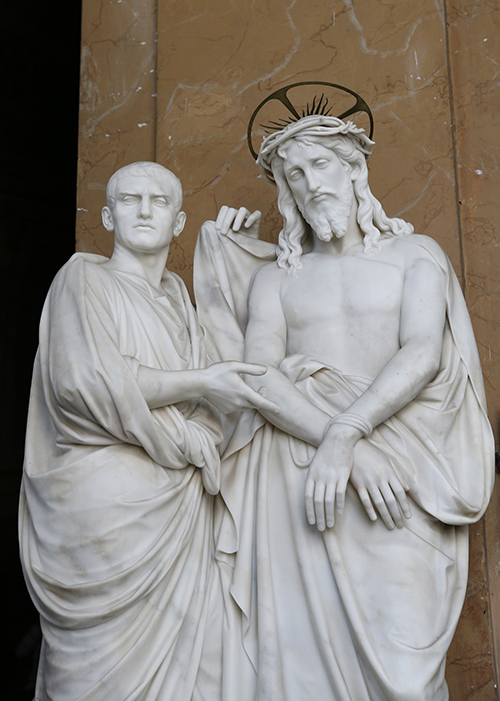8th and last in a series
It seems an especially wise choice that in his book “Broken Signposts: How Christianity Makes Sense of the World,” N.T. Wright uses his last chapter to discuss the signpost of power. Wright identifies seven signposts (justice, spirituality, love, beauty, freedom, truth, and power) that he believes all persons and all cultures seek to embrace and promote.
Wright thinks that in the contemporary world these signposts seem not to be working, seem to be broken. In his book, Wright suggests that the healing of those signposts can come about by people learning and embracing the truths St. John presents beautifully in his gospel. I think that Wright’s chapter on power is an illuminating and inspiring summary of many of the wonderful insights he has offered in earlier chapters.

Noting that on the first page of the Bible many of God’s creatures are told to increase and multiply, Wright, emphasizing that human persons are expected to do more, writes the following:
“When humans are made, however, there is an extra dimension. Humans too are commanded to be fruitful and multiply (Gen. 1:26, 28) but they are given an extra awesome and responsible vocation: to ‘have dominion over the fish of the sea, over the birds of the air, and over the cattle, and over all the wild animals of the earth, and over every creeping thing that creeps upon the earth.’ (1:26, 28). Power, in other words, comes from God and is given to human beings.” (p.165)
Wright distinguishes the kind of power that Jesus has with the kind of power that many in the world possess. The following paragraph I found especially provocative and disturbing:
“How easy it has been, when human beings have glimpsed the human vocation to exercise this God-given power in the world, for them to ‘play God’ — while forgetting that the God they ought to be imitating is not the God of naked, bullying power, but the God of generous outgoing love, the power-sharing God, the God who works through vulnerable humans, the God who came and exercised his saving power as an utterly vulnerable human, a ‘man of sorrows, and acquainted with grief,’ as the King James Version translates Isaiah 53:3 (pp.73-74).”
Wright points out that in John’s gospel two types of power are depicted and two types of kingdoms. The worldly kingdom grows through the power expressed in fighting. This is how worldly kingdoms grow and flourish. The kingdom of God grows through love. We get glimpses of worldly power when Peter cuts off the ear of Malchus, the servant of the high priest, and in Pontius Pilate’s ability to decide whether or not Jesus will be crucified.
We get a glimpse of the power present in the Kingdom of God when Jesus heals Malchus and when Jesus courageously confronts Pilate and says to him that Jesus’ kingdom is not the sort that grows in this world and points out to Pilate that Pilate would have no power if it were not bestowed on him from above.
I confess that as far back as I can remember there is a statement made by Jesus when speaking to the apostles in chapter 12 of John’s gospel that scares me. The statement is the following:
“Amen, Amen, I say to you, unless a grain of wheat falls to the ground and dies, it remains just a grain of wheat; but if it dies it produces much fruit.”
My reaction is emotional rather than rational. It first happened many years ago but even up until today Jesus’ statement causes me to pause. The truth that we must die to self must frighten me. Though through faith I can handle my emotional reaction, it strikes me that I should examine my reaction, reflect on it to see if I can understand it better, and perhaps use it to grow. Certainly reflecting on Wright’s insights should be helpful.
Wright stresses the following:
“If Jesus’ kingdom were from this world, his servants would fight. Pilate has that kind of authority too, the authority to have Jesus killed. This is ‘normal power’, the usual method of ‘kingdom.’ But Jesus’ kind of power works the other way. It works through suffering love, through the one who gives his life for his friends, the one who is lifted up like the serpent in the wilderness so that all may see him, believe, and be rescued — rescued from the grip of the other power, the dark power. And the ultimate rescue from the ultimate dark power is of course resurrection.” (p. 183)
I suspect and hope that in the future, having benefited from reading and reflecting on Wright’s book and John’s gospel, my reaction to the statement about wheat dying might be less emotional fear and more Christian hope.
Father Lauder is a philosophy professor at St. John’s University, Jamaica. He presents two 15-minute talks from his lecture series on the Catholic Novel, 10:30 a.m. Monday through Friday on NET-TV.
